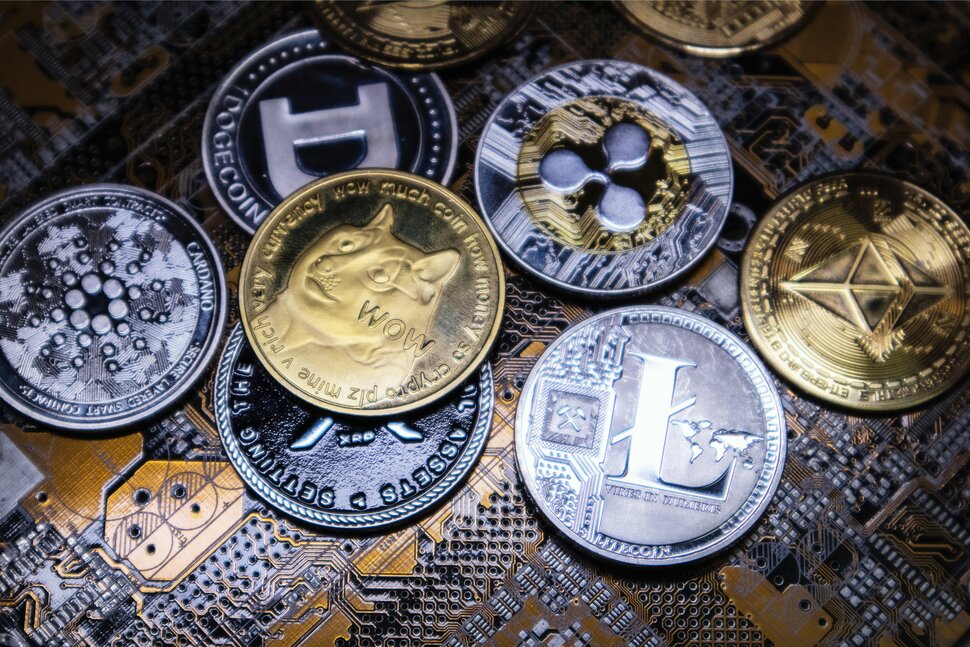| # | Coin | Price | 24h % | Market Cap | Volume | 24h Range |
|---|---|---|---|---|---|---|
| 1 |
|
$105,164.00 | -0.39% | $2,090,350,616,997 | $25,383,692,238 |
$104,648.00
―
$105,910.00
|
| 2 |
|
$2,621.67 | 0.28% | $316,495,829,386 | $16,869,423,366 |
$2,606.32
―
$2,667.17
|
| 3 |
|
$1.00 | -0.02% | $153,776,460,975 | $39,538,339,985 |
$1.00
―
$1.00
|
| 4 |
|
$2.21 | -1.92% | $129,863,671,631 | $1,664,122,019 |
$2.20
―
$2.26
|
| 5 |
|
$665.88 | -0.28% | $97,157,022,513 | $579,837,980 |
$663.06
―
$671.69
|
| 6 |
|
$154.03 | -1.51% | $80,767,573,901 | $2,809,343,705 |
$153.38
―
$157.64
|
| 7 |
|
$1.00 | 0.00% | $61,504,876,438 | $5,815,021,310 |
$1.00
―
$1.00
|
| 8 |
|
$0.19 | -2.68% | $28,426,731,598 | $741,115,106 |
$0.19
―
$0.20
|
| 9 |
|
$0.27 | 1.30% | $25,887,530,255 | $486,518,748 |
$0.27
―
$0.27
|
| 10 |
|
$0.67 | -3.04% | $24,326,864,633 | $462,510,202 |
$0.67
―
$0.70
|
| 11 |
|
$2,620.02 | 0.26% | $23,489,317,526 | $14,558,649 |
$2,605.68
―
$2,664.10
|
| 12 |
|
$104,968.00 | -0.57% | $13,515,748,330 | $127,630,357 |
$104,577.00
―
$105,874.00
|
| 13 |
|
$35.60 | -2.20% | $11,888,874,071 | $252,765,586 |
$34.77
―
$37.01
|
| 14 |
|
$3,139.37 | -0.33% | $11,182,677,513 | $3,204,051 |
$3,136.43
―
$3,211.67
|
| 15 |
|
$3.20 | -2.21% | $10,873,603,921 | $725,485,003 |
$3.15
―
$3.29
|
| 16 |
|
$13.87 | -2.96% | $9,118,297,695 | $252,587,823 |
$13.76
―
$14.43
|
| 17 |
|
$20.20 | -5.90% | $8,517,683,040 | $321,906,146 |
$20.04
―
$21.56
|
| 18 |
|
$0.27 | -2.36% | $8,339,103,612 | $147,516,271 |
$0.27
―
$0.28
|
| 19 |
|
$8.96 | -0.59% | $8,276,894,430 | $3,339,288 |
$8.87
―
$9.13
|
| 20 |
|
$401.87 | -0.43% | $7,988,053,405 | $139,488,204 |
$399.17
―
$409.81
|
| 21 |
|
$3.22 | 0.04% | $7,927,479,539 | $176,740,715 |
$3.15
―
$3.22
|
| 22 |
|
$0.0(4)12 | -1.41% | $7,611,029,847 | $127,940,957 |
$0.0(4)12
―
$0.0(4)13
|
| 23 |
|
$1.00 | -0.01% | $7,155,764,662 | $5,728,178 |
$1.00
―
$1.00
|
| 24 |
|
$0.17 | -2.23% | $7,138,842,416 | $97,583,891 |
$0.17
―
$0.17
|
| 25 |
|
$2,621.75 | 0.24% | $7,029,283,771 | $57,039,037 |
$2,601.70
―
$2,667.39
|
| 26 |
|
$2,802.86 | 0.32% | $6,818,950,282 | $13,693,337 |
$2,786.29
―
$2,847.83
|
| 27 |
|
$88.72 | -1.63% | $6,739,006,028 | $276,704,434 |
$87.80
―
$90.95
|
| 28 |
|
$4.03 | -3.51% | $6,138,566,002 | $175,915,369 |
$4.00
―
$4.20
|
| 29 |
|
$1.00 | 0.02% | $5,985,167,654 | $6,454,880,672 |
$1.00
―
$1.00
|
| 30 |
|
$318.45 | -8.15% | $5,875,651,609 | $97,054,218 |
$306.23
―
$352.15
|
| 31 |
|
$1.00 | -0.02% | $5,826,078,414 | $72,527,289 |
$1.00
―
$1.00
|
| 32 |
|
$4.73 | -2.01% | $5,533,487,986 | $36,075,640 |
$4.72
―
$4.86
|
| 33 |
|
$0.0(4)11 | -3.36% | $5,043,426,671 | $765,857,573 |
$0.0(4)11
―
$0.0(4)12
|
| 34 |
|
$0.65 | -0.36% | $4,758,739,916 | $67,482,436 |
$0.64
―
$0.66
|
| 35 |
|
$105,332.00 | -0.25% | $4,734,455,735 | $191,639,076 |
$104,187.00
―
$105,935.00
|
| 36 |
|
$31.34 | 0.00% | $4,517,051,883 | $22,096,190 |
$31.24
―
$31.39
|
| 37 |
|
$265.16 | 0.03% | $4,018,300,691 | $422,130,272 |
$263.10
―
$273.89
|
| 38 |
|
$6.32 | -5.31% | $3,795,987,766 | $418,255,438 |
$6.29
―
$6.82
|
| 39 |
|
$1.00 | 0.02% | $3,546,171,129 | $78,672,483 |
$1.00
―
$1.00
|
| 40 |
|
$379.89 | -3.31% | $3,341,486,897 | $84,236,440 |
$377.94
―
$398.70
|
| 41 |
|
$4.82 | -3.18% | $3,042,969,474 | $129,523,554 |
$4.77
―
$5.01
|
| 42 |
|
$50.10 | -0.60% | $3,006,128,354 | $5,185,707 |
$49.94
―
$50.40
|
| 43 |
|
$2.46 | -3.90% | $3,003,596,107 | $145,171,263 |
$2.43
―
$2.57
|
| 44 |
|
$1.00 | 0.00% | $2,912,394,047 | - |
$1.00
―
$1.00
|
| 45 |
|
$5.31 | -0.94% | $2,832,476,873 | $65,448,430 |
$5.20
―
$5.47
|
| 46 |
|
$17.35 | -1.92% | $2,641,235,351 | $58,124,424 |
$17.22
―
$17.82
|
| 47 |
|
$0.83 | -2.49% | $2,634,276,496 | $78,709,259 |
$0.83
―
$0.86
|
| 48 |
|
$1.05 | -0.03% | $2,602,233,149 | $9,163,867 |
$1.05
―
$1.05
|
| 49 |
|
$31.34 | -3.96% | $2,507,241,458 | $20,301,061 |
$30.76
―
$32.63
|
| 50 |
|
$19.17 | -0.65% | $2,326,891,741 | $7,812,547 |
$19.16
―
$19.39
|
| 51 |
|
$0.67 | -2.11% | $2,242,315,998 | $167,630,184 |
$0.66
―
$0.68
|
| 52 |
|
$0.08 | -4.64% | $2,207,064,458 | $50,955,452 |
$0.08
―
$0.09
|
| 53 |
|
$10.91 | -2.15% | $2,182,898,582 | $293,030,001 |
$10.78
―
$11.23
|
| 54 |
|
$0.80 | -3.20% | $2,085,231,511 | $134,213,277 |
$0.79
―
$0.83
|
| 55 |
|
$0.02 | -3.91% | $2,055,720,934 | $35,816,109 |
$0.02
―
$0.02
|
| 56 |
|
$3.80 | -3.69% | $1,966,170,387 | $80,462,344 |
$3.73
―
$3.98
|
| 57 |
|
$0.32 | -7.21% | $1,941,899,898 | $283,614,356 |
$0.31
―
$0.35
|
| 58 |
|
$4.29 | -3.19% | $1,941,865,408 | $93,503,581 |
$4.26
―
$4.46
|
| 59 |
|
$104,678.00 | -0.63% | $1,914,589,919 | $15,478,586 |
$103,444.00
―
$105,985.00
|
| 60 |
|
$4.42 | -0.19% | $1,898,330,554 | $54,427,982 |
$4.41
―
$4.43
|
| 61 |
|
$0.36 | -0.68% | $1,758,694,552 | $201,412,163 |
$0.36
―
$0.37
|
| 62 |
|
$2.59 | -1.63% | $1,751,771,698 | $88,992,434 |
$2.55
―
$2.65
|
| 63 |
|
$0.19 | -4.16% | $1,650,670,103 | $44,431,157 |
$0.19
―
$0.20
|
| 64 |
|
$1.00 | 0.08% | $1,591,673,712 | $4,736,588,877 |
$0.99
―
$1.01
|
| 65 |
|
$2,624.91 | 0.52% | $1,588,303,422 | $43,237,105 |
$2,603.29
―
$2,669.25
|
| 66 |
|
$2.17 | -4.17% | $1,435,825,893 | $73,539,991 |
$2.14
―
$2.28
|
| 67 |
|
$11.16 | -0.24% | $1,394,461,218 | $4,380,727 |
$11.13
―
$11.20
|
| 68 |
|
$162.31 | -1.73% | $1,353,227,121 | $1,100,821 |
$161.84
―
$165.99
|
| 69 |
|
$1.25 | -0.37% | $1,246,774,100 | $9,280,445 |
$1.24
―
$1.26
|
| 70 |
|
$2,982.52 | 0.25% | $1,242,486,222 | $1,991,838 |
$2,964.46
―
$3,031.40
|
| 71 |
|
$0.0(4)15 | -6.14% | $1,229,532,921 | $136,231,797 |
$0.0(4)15
―
$0.0(4)17
|
| 72 |
|
$1.83 | -6.97% | $1,196,952,265 | $291,415,653 |
$1.71
―
$1.97
|
| 73 |
|
$12.18 | -5.18% | $1,191,779,646 | $120,486,232 |
$12.03
―
$13.09
|
| 74 |
|
$2,739.82 | 0.28% | $1,162,968,705 | $185,986 |
$2,724.78
―
$2,788.61
|
| 75 |
|
$4.08 | -2.91% | $1,145,982,546 | $60,536,624 |
$4.02
―
$4.24
|
| 76 |
|
$0.64 | -5.41% | $1,089,320,425 | $171,236,081 |
$0.63
―
$0.67
|
| 77 |
|
$1.15 | 0.87% | $1,069,512,641 | $90,164,022 |
$1.10
―
$1.21
|
| 78 |
|
$0.55 | -4.81% | $1,016,182,850 | $25,751,356 |
$0.55
―
$0.58
|
| 79 |
|
$1.00 | 0.30% | $998,833,093 | $1,214,464,268 |
$1.00
―
$1.00
|
| 80 |
|
$1.00 | -0.03% | $972,814,442 | $15,624,071 |
$1.00
―
$1.00
|
| 81 |
|
$2,797.36 | 0.46% | $960,329,270 | $1,306,717 |
$2,770.79
―
$2,839.76
|
| 82 |
|
$1,789.17 | -5.66% | $933,047,367 | $143,901,938 |
$1,768.57
―
$1,913.50
|
| 83 |
|
$0.93 | -12.71% | $931,599,629 | $203,431,083 |
$0.93
―
$1.08
|
| 84 |
|
$0.10 | -3.57% | $909,353,957 | $31,129,346 |
$0.09
―
$0.10
|
| 85 |
|
$0.89 | -8.76% | $889,122,123 | $367,627,904 |
$0.88
―
$0.98
|
| 86 |
|
$666.20 | -0.10% | $877,758,003 | $1,511,783,874 |
$662.91
―
$671.37
|
| 87 |
|
$2,751.13 | -0.03% | $876,644,970 | $11,403,803 |
$2,736.01
―
$2,795.55
|
| 88 |
|
$0.64 | -7.21% | $869,239,856 | $125,536,916 |
$0.64
―
$0.70
|
| 89 |
|
$104,967.00 | -0.59% | $865,993,071 | $85,310,543 |
$104,561.00
―
$105,920.00
|
| 90 |
|
$3,372.44 | 0.15% | $831,379,316 | $27,887,694 |
$3,348.81
―
$3,382.13
|
| 91 |
|
$3,386.45 | 0.24% | $813,088,944 | $35,390,316 |
$3,362.79
―
$3,394.45
|
| 92 |
|
$171.09 | -1.55% | $810,588,341 | $7,303,420 |
$170.58
―
$175.53
|
| 93 |
|
$50.24 | -7.25% | $807,702,214 | $79,554,511 |
$50.03
―
$54.18
|
| 94 |
|
$0.0(4)82 | -4.71% | $800,465,410 | $73,989,318 |
$0.0(4)81
―
$0.0(4)87
|
| 95 |
|
$0.88 | 1.91% | $789,281,065 | $180,236,904 |
$0.85
―
$0.92
|
| 96 |
|
$2.44 | 2.01% | $786,888,953 | $141,415,508 |
$2.40
―
$2.48
|
| 97 |
|
$0.02 | -4.31% | $741,495,492 | $57,843,805 |
$0.02
―
$0.02
|
| 98 |
|
$21.75 | 0.21% | $723,725,209 | $59,944,265 |
$21.51
―
$22.37
|
| 99 |
|
$0.01 | -3.20% | $699,749,416 | $26,800,639 |
$0.01
―
$0.02
|
| 100 |
|
$0.18 | -3.26% | $694,594,814 | $10,609,971 |
$0.18
―
$0.19
|
Bitcoin
BTCEthereum
ETHTether
USDTXRP
XRPBNB
BNBSolana
SOLUSDC
USDCDogecoin
DOGETRON
TRXCardano
ADALido Staked Ether
STETHWrapped Bitcoin
WBTCHyperliquid
HYPEWrapped stETH
WSTETHSui
SUIChainlink
LINKAvalanche
AVAXStellar
XLMLEO Token
LEOBitcoin Cash
BCHToncoin
TONShiba Inu
SHIBUSDS
USDSHedera
HBARWETH
WETHWrapped eETH
WEETHLitecoin
LTCPolkadot
DOTBinance Bridged USDT (BNB Smart Chain)
BSC-USDMonero
XMREthena USDe
USDEBitget Token
BGBPepe
PEPEPi Network
PICoinbase Wrapped BTC
CBBTCWhiteBIT Coin
WBTAave
AAVEUniswap
UNIDai
DAIBittensor
TAOAptos
APTOKB
OKBNEAR Protocol
NEARBlackRock USD Institutional Digital Liquidity Fund
BUIDLInternet Computer
ICPEthereum Classic
ETCOndo
ONDOsUSDS
SUSDSTokenize Xchange
TKXGate
GTMantle
MNTKaspa
KASOfficial Trump
TRUMPArtificial Superintelligence Alliance
FETVeChain
VETRender
RENDEREthena
ENACosmos Hub
ATOMLombard Staked BTC
LBTCFasttoken
FTNArbitrum
ARBFilecoin
FILAlgorand
ALGOFirst Digital USD
FDUSDBinance-Peg WETH
WETHCelestia
TIAKuCoin
KCSBinance Staked SOL
BNSOLNEXO
NEXORocket Pool ETH
RETHBonk
BONKVirtuals Protocol
VIRTUALInjective
INJKelp DAO Restaked ETH
RSETHStory
IPOptimism
OPSPX6900
SPXImmutable
IMXBinance Bridged USDC (BNB Smart Chain)
USDCPayPal USD
PYUSDMantle Staked Ether
METHMaker
MKRFartcoin
FARTCOINThe Graph
GRTdogwifhat
WIFWrapped BNB
WBNBRenzo Restaked ETH
EZETHCurve DAO
CRVArbitrum Bridged WBTC (Arbitrum One)
WBTCTether Gold
XAUTPAX Gold
PAXGJupiter Staked SOL
JUPSOLZcash
ZECFLOKI
FLOKILido DAO
LDOPancakeSwap
CAKEGALA
GALAEthereum Name Service
ENSJasmyCoin
JASMYIOTA
IOTA


